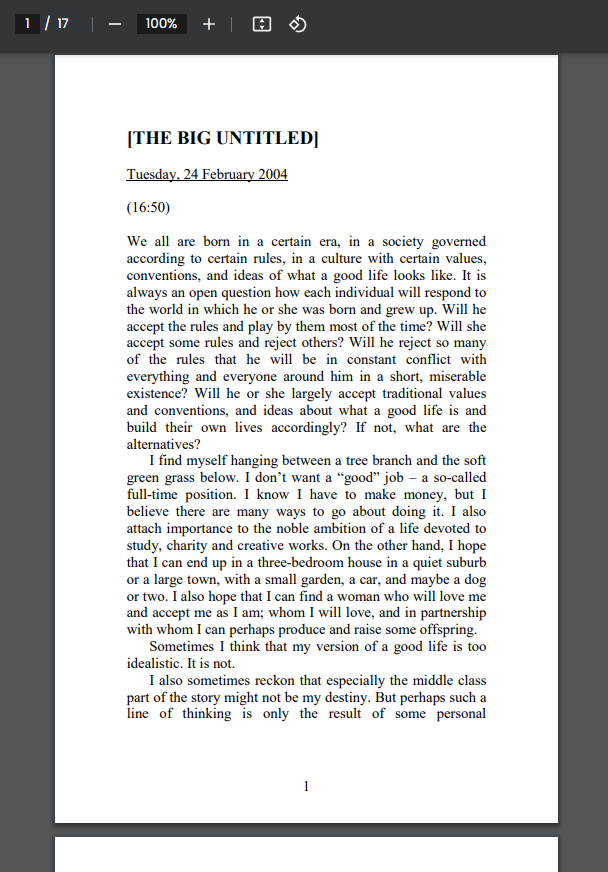TUESDAY, 30 JANUARY 2024
For new readers: I am 52 years and seven months old. I’ve been living in the south of Taiwan for more than 25 years, for the last 15 years or so with my wife, and for the last decade with two cats. And so on and so on.
Israel and Gaza: If one observes what Israel has done to Gaza and the Palestinians since 7 October 2023, I imagine a conversation between the Prime Minister of Israel, Benjamin Netanyahu, and an advisor:
Netanyahu: “What should our response be to Hamas?”
Advisor: “We need to destroy Hamas, even if we destroy the entire territory of Gaza and wipe out every man, woman and child who live there.”
Netanyahu: “Wouldn’t that be considered genocide?”
Advisor: “I guess it would.”
Netanyahu: “Let’s go.”
Trump as next US President: What do I know about American politics, and I am exceptionally bad at predictions, but I think Trump is indeed going to win the election in November 2024. Why would the Deep State and their thousands of collaborators in the political establishment, the media, academia, and the entertainment world allow this? Because Trump will give them what they need. He will put a stop to the waves of undocumented immigrants flowing across the US border. They would criticise him while he’s doing it, even though they’ll know he is solving a problem they caused. He will put a stop to the excesses of the so-called Social Justice Left of the last decade or so. Of course they would pay lip service to the ideology while he tries to bottle it back up. He will also at least make an attempt to negotiate with Putin – for which they will also criticise him, knowing that everyone including their pet project Zelensky needs it. Israel is not a problem, because Trump would continue to support Israel in their effort to empty Gaza and probably the West Bank of Palestinians.
America in the Middle East: If America continues to assist Israel with weapons, money, and moral support in their mass murder of the residents of Gaza in an attempt to prepare the area for colonisation by Israeli occupiers, armed groups in Palestine, Lebanon, Syria, Yemen, Iraq, and perhaps Egypt will continue to attack US troops and bases in the Middle East. This will put America in a difficult situation. More American boots on the ground is not going to work. Bombing campaigns will only work on a scale that does not involve Iran. If Iran gets involved, it would likely be with missiles against which America cannot protect its assets in the region. America knows this, which means they know they are playing with fire. Are they stupid enough to dip their fingers in gasoline and then stick them in the flames?
Russia and Ukraine: A few more months of thousands of men (and women) desperately pushing against Russian military supremacy to keep a morally corrupt government in Kiev in power, enabling their bloodthirsty political masters in Washington to steal several more billion dollars from the American taxpayer. Eventually, Russia will occupy Kiev, and among other places will also incorporate Odessa into the Russian Federation – to the approval of the majority of the population in those areas. What would remain and continue to be known as Ukraine would move its capital to Lvov.
Next South African election: Unfortunately, South Africa does not have a viable alternative to the ruling African National Congress. However, if a coalition does emerge between opposition parties and it seems that there is a greater than 50% chance that they might unseat the ANC, the government would suddenly discover that the American government is interfering in the election in order to punish the ANC for the case the government brought against Israel at the International Court of Justice in January 2024. I suspect this is what actually moved the ANC government to make the case against Israel in the first place, seeing that it is common knowledge that the ANC government itself is morally corrupt. The government would then use this real or imagined interference to postpone the election, or if the election actually takes place and they lose significant enough support, refuse to accept the results.
* * *
As for the existential experience of being a 52-year-old man living in southern Taiwan, married, two cats – actually my wife’s pets because they simply accept me as a fourth animal in the house … Stay tuned.
______________________
